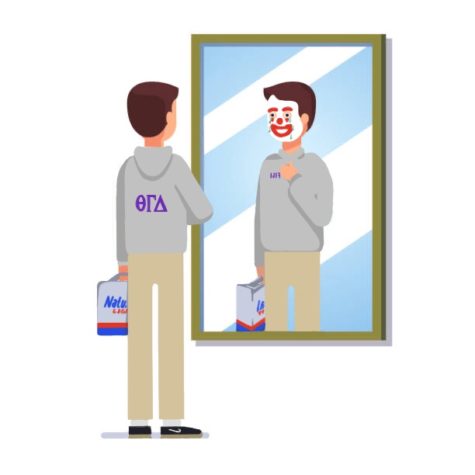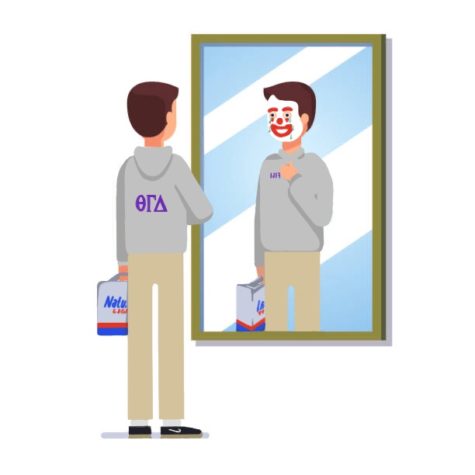
If you’re going to be stupid, at least be smart about it.
That being said, using an anti-gay slur in a fraternity recruitment spreadsheet goes far beyond just stupidity.
This was the case for Tulane University’s Tau Upsilon chapter of the Phi Gamma Delta (FIJI) fraternity. On Monday, Nov. 28, the chapter’s “Freshman Rush List” was leaked and sent to The Hullabaloo.
On that list were the names of over 60 potential recruits, color-coded on a spreadsheet: dark green for those worthy of an invitation to the next social event, light green indicating “cool,” orange for those who required more vetting, purple for abroad and red — those categorized as the anti-gay slur that should never, ever, be used to insult to one’s character.
Greek life is inherently exclusive, inherently selective and relies on active members agreeing to judge potential new members upon certain criteria — everyone knows this, and college students choose to either participate in this process, subjecting themselves to the scrutiny of their peers, or to opt-out of this often-questionable social scene.
Those who chose to participate, though, likely expect active members to comment on their sociability, the characteristics they might bring to a chapter, how well they relate to other members and how well they align with the organization’s core values.
According to Phi Gamma Delta’s national website, these core values are friendship, knowledge, service, morality and excellence.
None of these values were reflected in the leaked document.
Rather, FIJI characterized potential new members as such: “tall … texted me ‘excited ferda darty’ (negative),” “hella hoes (lol), good looking guy, very chill and not weird with women,” “needs to shave his f***ing beard,” “tall, hot shy but prolly j nervous.”
Other descriptions included, “Tall, Jewish …,” “Tall, [ableist slur], goon …” “super chill kid, knows lots of heads,” “chill kid wont stop talking about dye, not that tall,” “all around chiller, middle round bid grade, smells like an absolute mound of dog [expletive].”
The characterizations above described individuals in all of the categories, from invite-worthy to absolute no-go. However, these characteristics are not only superficial, reductive and unaligned with the chapter’s stated values, but they neither explicitly state one’s sexuality nor suggest it.
But it raises the question: if the members behind this list did not criticize potential new members for being gay (negative?), why on earth would they opt to characterize immediate rejects under the f-slur?
The f-slur and the word “gay” have long been used as demeaning insults. The root of the slur is most commonly understood across cultures as a way to suggest one’s femininity in a derogatory way; as such, the word has been used to denigrate homosexual men or effeminate men.
Now, the word is commonly understood as a harmful slur that heterosexual and non-queer people should never utter. However, words that describe queerness are often used as insults to describe someone as weird, abnormal or not typically masculine.
Even though the word may not be intended to insult homosexuality in all cases, its use still associates abnormality with being gay. Given that 7.1% of the U.S. population identifies as LGBTQ+, and 71% of Americans support gay marriage as of this June, why are young men casually throwing around words that suggest that being gay is inconducive with their preferred conceptions of masculinity?
Do certain individuals think that slurs, no matter how unacceptable, are funny? Did the members who created this list see no other way to label those they wanted to reject as the f-slur?
According to a statement from Phi Gamma Delta’s Executive Board, “The Tau Upsilon Chapter of Phi Gamma Delta (FIJI) is disgusted with the recent homophobic and harmful behavior displayed on an unofficial recruitment document. These actions do not represent who we are at FIJI or any of our fraternity values. FIJI is seriously investigating those responsible, and the known individuals have been suspended until further notice from Phi Gamma Delta nationals.”
To prevent incidents like this from happening again and in hopes of making their organization a safer space, FIJI stated that its nationals will be conducting a full membership review of each member in the chapter. Additionally, FIJI will be collaborating with community engagement advocates through the Office of Multicultural Affairs to “have an honest conversation about homophobia in greek life and how to make greek life more inclusive for everyone.”
“We are dedicated to putting in the work necessary to make FIJI better and repairing the harm done,” said the board.
The chapter’s leadership does not condone this behavior and this language. But, it is severely problematic that members believed they had the license to use the slur in a document that would influence the organization’s membership. It is particularly appalling that they believed this behavior would be overlooked within their chapter.
How many people saw this list? Who decided how to label recruits? Who was complacent in perpetuating this culture of casually throwing around homophobic language? It may be safe to assume that more than just the one person whose gross negligence contributed to the leak was apathetic about the use of a blatant slur.
There is no criteria to categorize an individual as the f-slur in this list. The ambiguous use of a severely harmful word leaves to the imagination what other hateful language is used within fraternity environments to describe queer people generally — not just the many cisgender and heterosexual men who often seek out fraternity membership.
Here’s the larger issue: it is often the case that when it comes to the big stuff — homophobia, misogyny, sexual assault, racism, xenophobia and antisemitism, among others — fraternities nationwide are publicly pressured to take active stances on these subjects only after faced with controversy.
Dear fraternities, and other Greek organizations:
Be very careful about how you choose to recruit new members. Be careful with your words and be careful with your actions — be careful with your documents, too, if they’re not suitable for the public eye. Be proactive in taking active, not just performative, stances to make your chapters inclusive, moral and excellent, or whatever.
Because, as society at large becomes increasingly tolerant, accepting and celebratory of marginalized groups, the spaces traditionally reserved for toxic, white masculinity become less trendy with each major slip-up. If these types of offenses continue to occur, even below a chapter-wide level, Greek organizations will fail to justify their existence.








